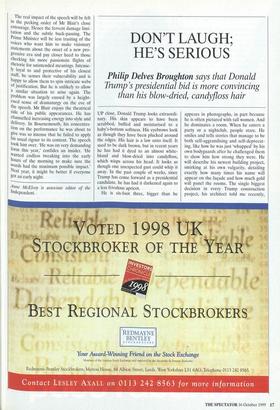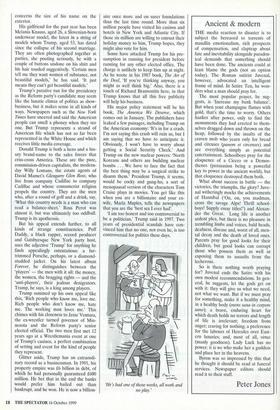DON'T LAUGH; HE'S SERIOUS
Philip Delves Broughton says that Donald Trump's presidential bid is more convincing than his blow-dried, candyfloss hair
UP close, Donald Trump looks extraordi- nary. His skin appears to have been scrubbed, buffed and moisturised to a baby's-bottom softness. His eyebrows look as though they have been plucked around the edges. His hair is a law unto itself. It used to be dark brown, but in recent years he has had it dyed to an almost white- blond and blow-dried into candyfloss, which wisps across his head. It looks as though one unexpected gust could whip it away. In the past couple of weeks, since Trump has come forward as a presidential candidate, he has had it darkened again to a less frivolous apricot.
He is six-foot three, bigger than he appears in photographs, in part because he is often pictured with tall women. And he dominates a room. When he enters a party or a nightclub, people stare. He smiles and tells stories that manage to be both self-aggrandising and self-deprecat- ing, like how he was just `whupped' by his own bodyguards after he challenged them to show him how strong they were. He will describe his newest building project, smirking at his own vulgarity, detailing exactly how many times his name will appear on the façade and how much gold will panel the rooms. The single biggest decision in every Trump construction project, his architect told me recently, concerns the size of his name on the exterior.
His girlfriend for the past year has been Melania Knauss, aged 26, a Slovenian-born underwear model, the latest in a string of models whom Trump, aged 53, has dated since the collapse of his second marriage. They are often photographed together at parties, she pouting seriously, he with a couple of buttons undone on his shirt and his hair tousled suggestively. 'Certain men tell me they want women of substance, not beautiful models,' he has said. 'It just means they can't get beautiful models.'
Trump's putative run for the presidency as the Reform party's candidate may seem like the lunatic climax of politics as show- business, but it makes sense in all kinds of ways. Newspapers such as the New York Times have sneered and said the American people can smell a phoney when they see one. But Trump represents a strand of American life which has not so far been represented in the White House and which receives little media coverage.
Donald Trump is both a hero and a lux- ury brand-name to the sales forces that criss-cross America. These are the pure, commission-driven capitalists, the modern- day Willy Lomans, the estate agents of David Mamet's Glengany Glen Ross, who live from company Cadillac to company Cadillac and whose consumerist religion propels the country. They are the men who, after a round of golf and a drink, say, 'What this country needs is a man who can read a balance-sheet.' Ross Perot was almost it, but was ultimately too oddball. Trump is its apotheosis.
But his appeal extends further, to all kinds of strange constituencies. Puff Daddy, a black rapper, record producer and Gatsbyesque New York party host, uses the adjective 'Trump' for anything he finds appealingly ostentatious: a fur- trimmed Porsche, perhaps, or a diamond- studded jacket. On his latest album Forever, he distinguishes between the 'players' — the men with it all: the money, the women, the bragging rights — and the 'anti-players', their jealous denigrators. Trump, he says, is a king among players.
Trump summed up his own appeal like this, 'Rich people who know me, love me. Rich people who don't know me, hate me. The working man loves me.' This chimes with his closeness to Jesse Ventura, the ex-wrestler turned governor of Min- nesota and the Reform party's senior elected official. The two men first met 12 years ago at a Wrestlemania event at one of Trump's casinos, a perfect combination of setting and event for the kind of people they represent.
Glitter aside, Trump has an extraordi- nary record as a businessman. In 1991, his property empire was £6 billion in debt, of which he had personally guaranteed £600 million. He bet that in the end the banks would prefer him bailed out than bankrupt, and he won. He is now a billion-
aire once more and on surer foundations than the last time round. More than six million people have visited his casinos and hotels in New York and Atlantic City. If those six million are willing to entrust their holiday money to him, Trump hopes, they might also vote for him.
Some have attacked Trump for his pre- sumption in running for president before running for any other elected office. The charge is unlikely to keep him up at night. As he wrote in his 1987 book, The Art of the Deal, 'If you're thinking anyway, you might as well think big.' Also, there is a touch of Richard Bransonitis here, in that Trump knows that all this free publicity will help his business.
His major policy statement will be his book, The America We Deserve, which comes out in January. The publishers have leaked a few passages, including Trump on the American economy: It's in for a crash. I'm not saying this crash will ruin us, but I am saying that we have to anticipate it. Obviously, I won't have to worry about getting a Social Security Check.' And Trump on the new nuclear powers: 'North Koreans and others are building nuclear bombs . . . We have to face the fact that the best thing may be a surgical strike to disarm them.' President Trump, it seems, would be cocky and gung-ho, a sort of menopausal version of the characters Tom Cruise plays in movies. You get like this when you are a billionaire and your ex- wife, Marla Maples, tells the newspapers that you are the 'best sex I ever had'.
'I am too honest and too controversial to be a politician,' Trump said in 1997. Two years of presidential scandals have con- vinced him that no one, not even he, is too controversial for politics these days.
'He's had one of those weeks, all work and no play.'



















































































 Previous page
Previous page